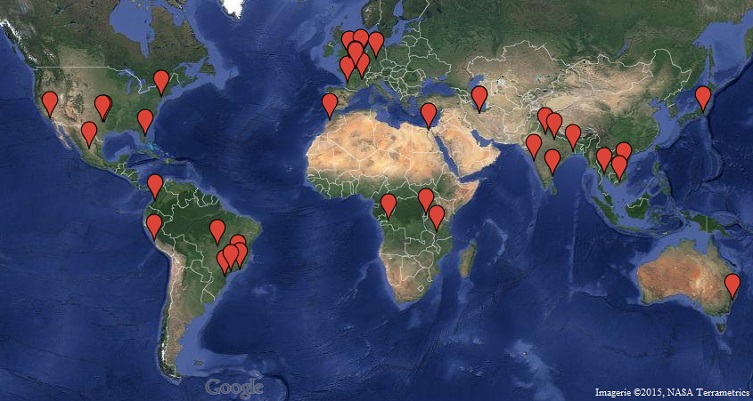Distribution of case studies of oral communications

Themes of the conference
A. Deciding factors
A.1 The management of sanitation and drinking water supply
- Strategies for access to water and sanitation, connection with urban planning
- Elimination of wastes and management of the quality of the water resources
- The cost of access to water and sanitation
- Access to water and sanitation in poor suburban areas
- Territorial conflicts on water supply
- Water management standards in megacities
A.2 The position and the role of water in megacities
- Water and Nature restoration vs artificiality of towns (Green vs. Gray Infrastructure)
- Water as a marker of seasons and passing time, in very urbanized human societies
- Water in the city as a potential for climate change adaptation
- New water culture: social, cultural, resources
A.3 The resiliency of megacities vs main risks, the effects of climate change and their mitigation
- Identification and definition of the evolution of the risks in the megacities, in the context of climate change
- Tools for diagnosis and analysis of the resiliency of megacities
- Planning and integrating today the possible effects of climate change
- Population and decision-makers awareness
- Thinking and designing the urban development and being prepared for extreme risks (hurricanes, floodings, heat waves, droughts). Designing the resiliency of megacities.
A.4 Megacities and new risks
- Public health, micro pollutants, management scales
A.5 Weight of the assets on present management choices
- Technical heritage and systems organization: advantage or constraint to adaptation?
- Asset management, maintenance and durability
B - Solutions
B.1 Forms of innovations by technical approaches
- Global change and availability of the resources (including energy) and suitability of classic sanitation models. Wastewater added value
- Water and the « metabolism » of megacities: energy flows, nitrogen and phosphorus flows, food production
B.2 Forms of innovation in economy, in politics, and in institutions
- Social inequities and access to water and sanitation: issues and solutions
- Water management in megacities: inspiring tools for financing the investments and how to use them
- Existing or future regulatory models at these levels
- Governance, cooperation and coordination between the actors. Sharing/dilution of power and responsibilities.
- Case studies of such innovations in megacities
B.3 Human actors and the technology: benefits and limits of smart tools
- Potential and limits of the smart city concept. Political issues and technical realities. Man/machine complementarity in smart systems
- New behaviors and perceptions for new water management models ?
- New issues in data production and data control: methods, technics and ethics
B.4 The paradoxes of sustainable development: incompatibility of objectives, constraints and setting up of priorities
- Evaluation of sustainable development and water management
- Sustainable water management in a city: meaning and case studies of public policies related to megacities specific issues
- Environmental norms and restoration of aquatic environment
- Environmental norms and preservation of public health within the framework of water policy
C. Other



